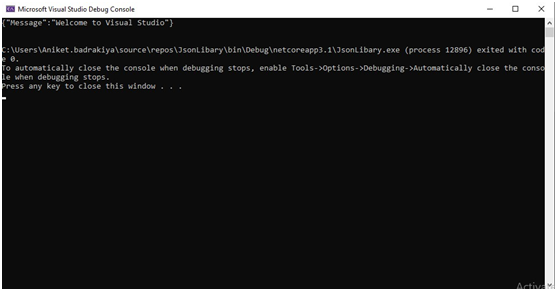
iFour Team - December 30, 2020

There are many new features and performance improvements in .NET 5.0. No exception was found in System.Text.Json. Many Developers familiar with Newtonsoft.Json have improved performance, reliability and made it easier. In .NET 5.0 the progress that has been made with System.Text.Json and what’s going to come next will discuss about in more details.
You can install .NET 5.0 for your project requirements is in .NET 5, This provides you System.Text.Json right out of the box, without any other pre-requisites.
If your project requirements in .NET Core 3.x or .NET Framework and .NET Standard compatible library so you can install the latest package System.Text.JsonNuget Package.
If your project requirements in .NET Core 3.x or .NET Framework and .NET Standard compatible library so you can install the latest package System.Text.JsonNuget Package.
The System.Text.Json is the built-in JavaScript Object Notation (JSON) serialization library in .NET for converting from .NET object types to a JSON string, and vice versa, supporting UTF-8 text encoding. JsonSerializer library was first added in .NET Core 3.0. It’s a popular type in the library JsonSerializer, which provides the highest level of functionality of processing JSON data.
Example:
usingSystem.Text.Json;
namespaceJsonLibary
{
classProgram
{
staticvoid Main(string[] args)
{
Some obj = new() { Message = "Welcome to Visual Studio" };
stringjson = JsonSerializer.Serialize(obj);
Console.WriteLine(json);
Some secondObject = JsonSerializer.Deserialize("{}");
Console.WriteLine(secondObject.Message);
}
publicclassSome
{
publicstring Message { get; set; }
}
}
}

Figure:Output Screen
When you are using .NET Core 3.0, the deserializing number types encoded as JSON strings were not supported by default. You can add a custom converter for each applicable number type which would take control of the serialization and deserialization of the type, and include logic to handle quoted numbers.
There is an opt-in feature to support serializing and deserializing quoted numbers, and named floating-point literals like Nan, Infinity, and, -Infinity in .NET 5.0
Example
using System;
usingSystem.Text.Json;
usingSystem.Text.Json.Serialization;
namespaceJsonLibary
{
classProgram
{
publicsealedpartialclassJsonSerializerOptions
{
publicJsonNumberHandlingNumberHandling{ get; set; }
}
[Flags]
publicenumJsonNumberHandling :byte
{
None = 0x0,
AllowReadingFromString = 0x1,
WriteAsString = 0x2,
AllowNamedFloatingPointLiterals = 0x4
}
publicsealedpartialclassJsonNumberHandlingAttribute :JsonAttribute
{
publicJsonNumberHandling Handling { get; }
publicJsonNumberHandlingAttribute(JsonNumberHandling handling)
{
Handling = handling;
}
}
publicstaticvoid Main(string[] args)
{
var options = newJsonSerializerOptions
{
NumberHandling = JsonNumberHandling.AllowReadingFromString |
JsonNumberHandling.WriteAsString
};
string json = @"{""Message"":1,""Data"":""2""}";
Some @class = JsonSerializer.Deserialize(json, options);
Console.WriteLine(@class.Message);
Console.WriteLine(@class.Data);
json = JsonSerializer.Serialize(@class, options);
Console.WriteLine(json);
}
publicclassSome
{
publicstring Message { get; set; }
publicstring Data { get; set; }
}
}
}
When you serializing in .NET Core 3.x, there was only possible to ignore the null value for reference or nullable value-typed properties, the JsonSerilizerOptions.IgnoreNullValues setting was only applicable across an entire input object graph. We have to add support to ignore default values for non-nullable value types, such as int and float. Further, we are now possible to cherry-pick properties and fields to be ignored when default.
Example
var options = newJsonSerializerOptions
{
DefaultIgnoreCondition = JsonIgnoreCondition.WhenWritingDefault
};
varobj = newyourClass();
stringjson = JsonSerializer.Serialize(obj, options);
Console.WriteLine(json);
publicclassyourClass
{
publicintyourInt{ get; set; }
[JsonIgnore(Condition = JsonIgnoreCondition.Never)]
publicboolyourBool{ get; set; }
publicstringyourString{ get; set; }
}
Here we can see that we have passed the default value JsonIgnoreCondition.WhenWritingDefault in the JsonSerializerOptions class and this class declared with options variable, the JsonIgnoreCondition.WhenWritingDefault is ignoring only null values, but not default values.
After, we put the class name yourClass is declared with a new keyword and it identify with theobj variable.
Then, the obj and options value pass in the JsonSerializer.Serialize method with defined by JSON variable, print the JSON variable with console.WriteLine.
The JsonSerializerOptions coping the one instance to another instance,so we have added a copy constructor to JsonSerializerOptions which makes this easier for the user.
Example
JsonSerializerOptions opt = new()
{
Handling = JsonNumberHandling.AllowReadingFromString,
ignoreCondition = JsonIgnoreCondition.WhenWritingNull,
Converters = { newJsonStringEnumConverter() }
};
JsonSerializerOptionsnewOpt = new(opt)
{
Handling = JsonNumberHandling.Strict
};
Console.WriteLine(newOpt.Handling);
Console.WriteLine(newOpt.ignoreCondition);
Console.WriteLine(newOpt.Converters[0]);
There are some common set of options when processing JSON data in web contexts is to use the camelCase naming policy. You specify case-insensitive matching when deserializing, and allow reading quoted numbers. You have to declare the JsonSerializerDefaults.Webenum value, and a new constructor that takes a JsonSerializerDefaults value, provide an easy way to reuse these options in a consistent way across multiple layers of an application.
Example
JsonSerializerOptionsserializerOptions = new (JsonSerializerDefaults.Web); Console.WriteLine(serializerOptions.PropertyNamingPolicy); Console.WriteLine(serializerOptions.PropertyNameCaseInsensitive); Console.WriteLine(serializerOptions.Handling);
There is a major difference between .NET Core 3.1 and .NET 5, and we have improved performance in the following areas.
Performance improved for small types by serialization and deserialization
Performance improved for small types by serialization and deserialization
Performance improved for case-insensitive and missing-property cases by deserialization.
And performance improved for long JSON strings by serialization.
These above improvements are going to be specifically meaningful for high-performance apps.
The significant improvements for large collections made by us. These improvements are characterized in much more detail at dotnet/runtime #2259.
The significant efforts to improve .NET performance in the TechEmpower JSON benchmark in .NET 5.0. The performance when observing work done within the serializer is now ~19% better.
There are most common issues with using JSON is a mismatch of naming conventions with .NET design guidelines. The camelCase is used in JSON properties and the PascalCase is used in .NET properties and fields.
When we write relatively large JSON strings using the writer directly, there is ~30% improvement.
In this blog, we have learned about the System.Text.Json in .NET 5.0, and which JSON is better for developers like among Newtonsoft.Json and System.Text.Json. Before introducing .NET Core 3.1, most of the developers were using Newtonsoft.Json. It doesn’t provide many features compare to System.Text.Json.

January 23, 2023

September 21, 2021

September 20, 2021

July 23, 2021

July 06, 2021
Technology that meets your business requirements

Planning a cutting-edge technology software solution? Our team can assist you to handle any technology challenge. Our custom software development team has great expertise in most emerging technologies. At iFour, our major concern is towards driving acute flexibility in your custom software development. For the entire software development life-cycle, we implement any type of workflow requested by the client. We also provide a set of distinct flexible engagement models for our clients to select the most optimal solution for their business. We assist our customers to get the required edge that is needed to take their present business to next level by delivering various out-reaching technologies.









































































Get advanced technology that will help you find the
right answers for your every business need.

Get in touch
Drop us a line! We are here to answer your questions 24/7.